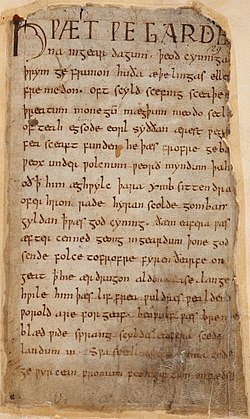Eduard Sievers developed a theory of the meter of Anglo-Saxon alliterative verse, which he published in his 1893 Altgermanische Metrik. Widely used by...
2 KB (255 words) - 23:17, 9 December 2024
Old English metre (redirect from Anglo-Saxon Poetic Line)
composed in the Anglo-Saxon period. The best-known example of poetry composed in this verse form is Beowulf, but the vast majority of Old English poetry...
10 KB (1,428 words) - 04:01, 28 May 2025
phenomenon of replacing a long syllable with 2 short syllables. Robert Bridges's theory of elision Scansion Sievers's theory of Anglo-Saxon meter Theopoetics...
30 KB (3,831 words) - 07:52, 24 November 2024
Old English literature (redirect from Anglo-Saxon poetry)
7th century to the decades after the Norman Conquest of 1066, a period often termed Anglo-Saxon England. The 7th-century work Cædmon's Hymn is often considered...
69 KB (8,155 words) - 12:05, 24 May 2025
("Outline of Germanic philology," Strassburg, 1891 et seq.). Wikimedia Commons has media related to Eduard Sievers. Sievers' Theory of Anglo-Saxon Meter Sievers'...
8 KB (718 words) - 23:16, 9 December 2024
Alliterative verse (category Articles containing Old Saxon-language text)
article: Bright's Anglo-Saxon Reader/Anglo-Saxon Versification Listen to this article (5 minutes) This audio file was created from a revision of this article...
93 KB (10,580 words) - 14:30, 23 May 2025
explanation of the prosody of Anglo-Saxon alliterative verse as Pound would have understood it, based on Sievers' Theory of Anglo-Saxon Meter.[citation...
1 KB (90 words) - 13:28, 10 April 2024
stages of Old English. Thus in lines categorised in Sievers' theory of Anglo-Saxon meter as A2a, such as Beowulf line 222a ('brimclifu blīcan') or 1171a ('goldwine...
7 KB (823 words) - 03:31, 16 November 2024
Metre (poetry) (redirect from Meter in poetry)
mægen.) The German philologist Eduard Sievers (died 1932) identified five different patterns of half-line in Anglo-Saxon alliterative poetry. The first three...
61 KB (7,822 words) - 18:41, 8 May 2025
Leonard Neidorf (category Anglo-Saxon studies scholars)
the field of Old English meter, Neidorf defends the metrical theories of Eduard Sievers and Robert D. Fulk. He argues for the utility of meter as a tool...
21 KB (1,624 words) - 15:27, 22 May 2025
Reverend Richard Polwhele in 1797; it was probably derived from the Anglo-Saxon god of war, Grim (more commonly known as Woden, or Odin). In 1893 an archaeological...
24 KB (3,338 words) - 23:30, 31 March 2025
Deutsches Museum, München, p. 13 Davidson, Hilda Ellis (1998). The Sword in Anglo-Saxon England: Its Archaeology and Literature. Boydell & Brewer Ltd. p. 20...
254 KB (25,795 words) - 10:22, 27 May 2025
In the early 20th century when the Anglo-Catholic Movement was at its height, the Anglican Communion had hundreds of orders and communities. However, since...
115 KB (14,026 words) - 14:12, 11 May 2025



